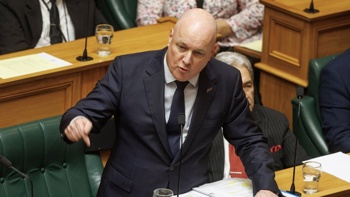The Government wants a national register for all firearms, tighter restrictions on who can get and retain a firearms licence, and a ban on visitors to New Zealand from buying any guns.
In announcing the second tranche of gun law reforms today, Prime Minister Jacinda Ardern also said licences will have to be renewed every five years - half of the time in the current scheme.
But she has ditched the recommendation for an independent body to oversee gun laws and regulations, which was recommended in the 1997 report by Sir Thomas Thorp, the last major review of gun laws.
Instead the police will set up the national register, and an independent group of experts, including people from the firearms community, will advise police and report annually.
The reforms, announced today by Ardern and Police Minister Stuart Nash, have been eagerly anticipated since the Government's ban on most military-style semi-automatic (MSSAs) firearms in the aftermath of the March 15 terrorist attacks in Christchurch.
The Police Association has been calling for a national register and welcomed today's announcement, but it is likely to increase the ire of gun lobby groups, given that many are already upset with the Government's buyback scheme for recently banned firearms.
The second tranche includes:
- A national gun register to record every firearm and firearms licence holder in the country, which would take five years to put in place
- A higher test for licence holders to get and retain a licence, including warning flags that would be grounds for police to revoke a licence and confiscate guns
- Licence holders will be disqualified if, in the previous 10 years, they
have convictions for serious crimes such as violence, gang activity, misuse of drugs,
firearms offences, or having a protection order made against them - Requiring a firearms licence to buy ammunition, magazines and gun parts
- Tighter rules for gun dealership licences, requiring excellent character and sound technical capability
- A new licensing system for the 260-odd shooting clubs and ranges, with ongoing monitoring
- A ban on having visitors buying a gun in New Zealand, though hunting visitors may bring their own and register it, or lease one
- Tighter rules on gun advertising; there are currently no restrictions
- New offences and higher penalties for breaking the rules
"Under the current law, we do not know exactly how many guns are in circulation, who owns them, who is selling them, who is buying them, or how securely they are stored against the risk of theft or misuse," Nash said.
"Police have very few options for intervening when they see concerning behaviour. Revoking a firearms licence can only happen for the most serious cases and can take weeks, during which time the guns can be given away or disappear without trace."
He said the system was outdated.
"There are higher penalties for unlawfully taking fish than for some firearms offences. It is cheaper to get a gun licence than a dog licence. We need to modernise the system."
Many of the finer details are still being worked out, but the main aim of the new bill - to be introduced next month - will be to ensure that owning a firearm is a privilege that demanded a commitment to safety.
The current law requires applicants to pass a police background check and be a "fit and proper" person.
The new rules would allow police to revoke firearms licences or demand safer storage if there were reasons for police intervention, such as a person promoting violence or extremism, being a threat to national security, or committing violent crimes.
Nash said the new rules around buying ammunition and gun parts would close a loop-hole that currently allowed anyone, such as a gang member, from buying such material from the local hunting shop.
The Government is yet to commit any funding for a national register, but it is expected to cost tens of millions of dollars.
The 1997 Thorp report recommended a new Firearms Authority to set up a national register - which was ditched with the Arms Act in 1983 - but successive governments failedto back it because of the high costs and the probable lack of compliance from gun owners.
But Thorpe said it would be worth it because it would assist police to confiscate firearms in domestic violence cases, boost responsibility from gun-owners, and better protect front-line police who would have more accurate information about where certain firearms were.
Nash agreed.
"They [police] turn up to some callouts with no knowledge of what they are walking into. Every month police are called to 200 crimes where a firearm is involved.
"Every year between 800 and 1000 firearms are reported stolen. They disappear onto the black market, many into the hands of gangs."
Canada attempted to register all guns in the 1990s, but the original estimated cost of CAD$2 million blew out to $1 billion and was eventually scrapped, except in Quebec.
Thorp also called for licences to be renewed every three years, but the Government has instead recommended five years, which is still half the current rule of 10 years.
The Government's first tranche of reforms were expedited through Parliament, but this tranche will be subjected to normal parliamentary processes, including a three-month select committee process for public consultation.
Take your Radio, Podcasts and Music with you









